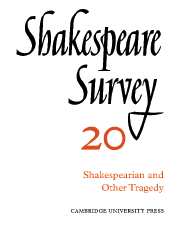Book contents
- Frontmatter
- Shakespeare, Fletcher and Baroque Tragedy
- Seneca and the Elizabethans: A Case-study in ‘Influence’
- George Chapman: Tragedy and the Providential View of History
- Critical Disagreement about Oedipus and Hamlet
- Shakespeare’s Thematic Modes of Speech: ‘Richard II’ to ‘Henry V’
- Anarchy and Order in ‘Richard III’ and ‘King John’
- The Staging of Parody and Parallels in ‘I Henry IV’
- Shakespeare’s Unnecessary Characters
- Walter Whiter’s Notes on Shakespeare
- Shakespeare’s ‘Romeo and Juliet’: Its Spanish Source
- The Grieves Shakespearian Scene Designs
- Shakespeare on the Modern Stage: Past Significance and Present Meaning
- Shakespeare in Brazil
- Recent Shakespeare Performances in Romania
- Shakespeare, the Twentieth Century and ‘Behaviourism’
- The Year's Contributions to Shakespearian Study 1 Critical Studies
- 2 Shakespeare’s Life, Times and Stage
- 3 Textual Studies
- Index
- Plate section
Shakespeare, the Twentieth Century and ‘Behaviourism’
Published online by Cambridge University Press: 28 March 2007
- Frontmatter
- Shakespeare, Fletcher and Baroque Tragedy
- Seneca and the Elizabethans: A Case-study in ‘Influence’
- George Chapman: Tragedy and the Providential View of History
- Critical Disagreement about Oedipus and Hamlet
- Shakespeare’s Thematic Modes of Speech: ‘Richard II’ to ‘Henry V’
- Anarchy and Order in ‘Richard III’ and ‘King John’
- The Staging of Parody and Parallels in ‘I Henry IV’
- Shakespeare’s Unnecessary Characters
- Walter Whiter’s Notes on Shakespeare
- Shakespeare’s ‘Romeo and Juliet’: Its Spanish Source
- The Grieves Shakespearian Scene Designs
- Shakespeare on the Modern Stage: Past Significance and Present Meaning
- Shakespeare in Brazil
- Recent Shakespeare Performances in Romania
- Shakespeare, the Twentieth Century and ‘Behaviourism’
- The Year's Contributions to Shakespearian Study 1 Critical Studies
- 2 Shakespeare’s Life, Times and Stage
- 3 Textual Studies
- Index
- Plate section
Summary
The ravages executed on Shakespeare by Restoration and eighteenth-century adaptors have become a source of academic speculation and amused commentary. But Peter Hall, the most distinguished and articulate begetter of contemporary adaptation, would, one is convinced, dissociate himself from Dryden and Tate. His position is simply that producers should ‘try to express Shakespeare’s intentions in terms that modern audiences can understand’. It is important to emphasize the distance in attitude between Hall and the early adaptors. The sharpest critic, unnerved by what seems extraneous sensationalism in a Hall production, must often accept that it is possible to detect a reason which goes beyond a mere desire for effect in what is presented. Hall gives the impression, in many of his statements, of having a potent, grave and reverent conception of the value of the plays, and a wish to relate their profundity to the realities of the contemporary world. Whereas Sir Tyrone Guthrie seems nearer in theory to the Restoration mode, and demonstrates it in practice by his ruthless cuts and interpolations, Hall is, by contrast, cautious. He has stated that ‘any cutting which alters or affects the theme of the play must be immoral’ and that ‘cuts should be made within speeches’.
- Type
- Chapter
- Information
- Shakespeare Survey , pp. 133 - 142Publisher: Cambridge University PressPrint publication year: 1967



